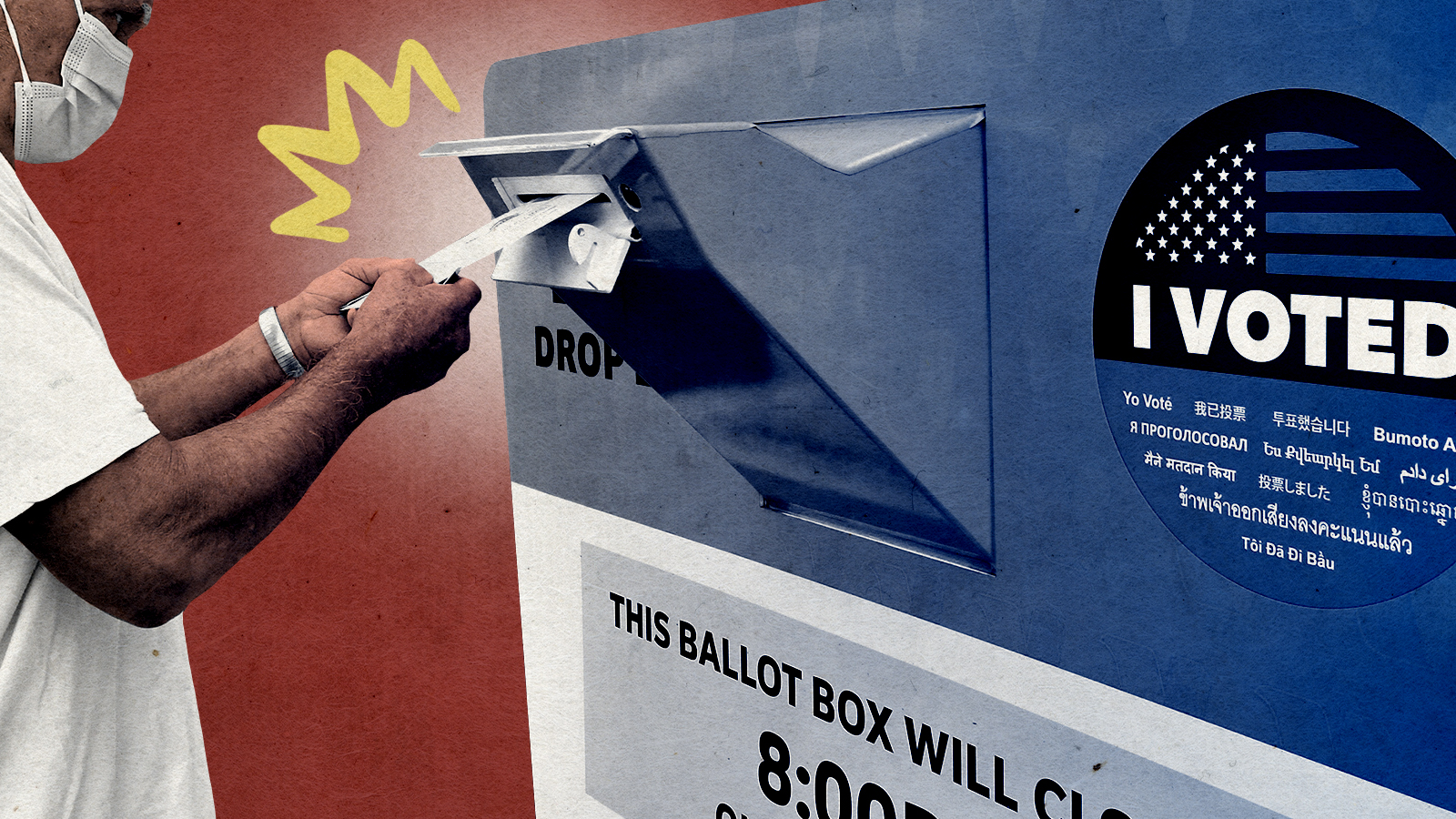How conspiracy theorists weaponized ballot boxes
Republicans say they permit election fraud, but the results suggest otherwise


A free daily email with the biggest news stories of the day – and the best features from TheWeek.com
You are now subscribed
Your newsletter sign-up was successful
Another election conspiracy quashed: There were no real problems with the use of drop boxes to collect ballots during the 2020 presidential election, an Associated Press investigation has found. A survey of voting officials found "no cases of fraud, vandalism or theft that could have affected the results," Anthony Izaguirre and Christina A. Cassidy write for AP.
The drop boxes are at the center of former President Donald Trump's ongoing (and false) efforts to declare Joe Biden's victory a fraud. Most recently, the film 2000 Mules made the case that Democratic fraudsters "were paid to illegally collect ballots and deliver them to drop boxes in key swing states ahead of the 2020 presidential election," Ali Swenson wrote in May, also for AP. The film — directed by Dinesh D'Souza, who received a pardon from then-President Trump in 2018 — has been widely and roundly debunked.
But proving a conspiracy theory is unfounded doesn't mean it will disappear. Drop boxes remain controversial — the Wisconsin Supreme Court just declared them illegal for that state's elections. Why are Democrats and Republicans struggling over drop boxes? Here's everything you need to know.
The Week
Escape your echo chamber. Get the facts behind the news, plus analysis from multiple perspectives.

Sign up for The Week's Free Newsletters
From our morning news briefing to a weekly Good News Newsletter, get the best of The Week delivered directly to your inbox.
From our morning news briefing to a weekly Good News Newsletter, get the best of The Week delivered directly to your inbox.
Why were drop boxes used so much in 2020?
The COVID-19 pandemic, obviously. Rather than make unvaccinated voters stand together in long lines on Election Day while a deadly virus was running rampant, officials in a number of states decided to use secure drop boxes — usually used for absentee ballots — as an alternative. There were also widespread concerns that the U.S. Postal Service wasn't up to the task of delivering ballots on time. And there was evidence they could be used safely: "In the 2016 campaign, one in six ballots cast were dropped in secure boxes — locked metal containers weighing as much as 600 pounds — with virtually no incidence of fraud," Glenn Thrush and Nick Corasaniti reported for The New York Times in 2020.
From the beginning, though, there was a partisan battle over the wisdom of using the drop boxes. Democrats and Republicans had already been battling over voter access issues for years, with Republicans citing nearly non-existent voter fraud in order to make it tougher to vote, while Democrats argued to make it easier. The 2020 election brought those fights to a new level. Even before the election, Trump claimed — without evidence — that the devices were insecure and would enable fraud. "Among other things, they make it possible for a person to vote multiple times," he tweeted. "Also, who controls them, are they placed in Republican or Democrat areas?" Republicans fought to limit the use of drop boxes, and succeeded in some GOP-controlled jurisdictions. Other states, like Pennsylvania, proceeded with their use. In the end, 10 states declined to make drop boxes available to voters.
How did that work out?
Lots of voters cast their ballots without going to the polls in 2020. According to the Pew Research Center, a small majority of Americans — just 54 percent — voted in person, while another 45 percent used either the drop boxes or mailed in their ballots. (Those votes were split fairly evenly between the mail and drop boxes.) The absentee voters were disproportionately Democratic: 58 percent of Biden backers voted using drop boxes or the mail, while just 32 percent of Trump voters did so. In an election where a few thousand votes in a few key states swung the election, that disparity probably made some difference. (Of course, many of those voters who used absentee methods might have decided to vote in person if that was the only option.)
That's probably why drop boxes have continued to play a central role in Trump's 2020 conspiracy-mongering. D'Souza's 2000 Mules movie has become popular among the former president's supporters. The problem with the accusations, though, is that it's difficult to find an expert who gives them any credence. "Ultimately, '2000 Mules' speculates that the so-called ballot-traffickers were dropping off fraudulent ballots — but the film does not prove this," Reuters reported in a May fact-check of the film, and noted that "more than 50 lawsuits brought by Trump or his allies alleging election fraud or other irregularities were dismissed by state and federal judges." The Washington Post's Philip Bump delivers a stark verdict: "So far, not only has no proof of rampant fraud been demonstrated, there hasn't been any evidence of even small-scale fraud."
A free daily email with the biggest news stories of the day – and the best features from TheWeek.com
So will voters get to use drop boxes in future elections?
Depends where you live — and if that's a state where Republicans run the government, it's likely your ability to use drop boxes has been diminished or eliminated entirely. (You can use this website from U.S. Voter to see if they're available where you vote.) Since the 2020 election, Georgia and Iowa have passed laws limiting the use of drop boxes, while "Louisiana, Missouri and South Carolina have passed laws effectively prohibiting drop boxes," Izaguirre and Cassidy report for AP. Even in states where drop boxes are in use, there might be controversy during the midterms. "Republican activists in Washington are organizing surveillance of ballot drop boxes," Jim Brunner reports for the Seattle Times, and that "has raised concerns about possible intimidation" during this year's midterm elections.
How future elections are affected by all of this remains to be seen. "Removing drop boxes will help rebuild the trust that has been lost," Georgia State Sen. Butch Miller (R) told States Newsroom's Kira Lerner. Others are skeptical, suggesting there wouldn't be much of an issue if Trump had won the 2020 election. From that standpoint, the problem was "making it easier for people to vote," said Amber McReynolds, an elections expert. Drop boxes, she said. were "politicized because people felt that it hurt them, or one person felt it hurt him."
Joel Mathis is a writer with 30 years of newspaper and online journalism experience. His work also regularly appears in National Geographic and The Kansas City Star. His awards include best online commentary at the Online News Association and (twice) at the City and Regional Magazine Association.
-
 How the FCC’s ‘equal time’ rule works
How the FCC’s ‘equal time’ rule worksIn the Spotlight The law is at the heart of the Colbert-CBS conflict
-
 What is the endgame in the DHS shutdown?
What is the endgame in the DHS shutdown?Today’s Big Question Democrats want to rein in ICE’s immigration crackdown
-
 ‘Poor time management isn’t just an inconvenience’
‘Poor time management isn’t just an inconvenience’Instant Opinion Opinion, comment and editorials of the day
-
 ‘Poor time management isn’t just an inconvenience’
‘Poor time management isn’t just an inconvenience’Instant Opinion Opinion, comment and editorials of the day
-
 Kurt Olsen: Trump’s ‘Stop the Steal’ lawyer playing a major White House role
Kurt Olsen: Trump’s ‘Stop the Steal’ lawyer playing a major White House roleIn the Spotlight Olsen reportedly has access to significant US intelligence
-
 Japan’s Takaichi cements power with snap election win
Japan’s Takaichi cements power with snap election winSpeed Read President Donald Trump congratulated the conservative prime minister
-
 How realistic is the Democratic plan to retake the Senate this year?
How realistic is the Democratic plan to retake the Senate this year?TODAY’S BIG QUESTION Schumer is growing bullish on his party’s odds in November — is it typical partisan optimism, or something more?
-
 The billionaires’ wealth tax: a catastrophe for California?
The billionaires’ wealth tax: a catastrophe for California?Talking Point Peter Thiel and Larry Page preparing to change state residency
-
 Bari Weiss’ ‘60 Minutes’ scandal is about more than one report
Bari Weiss’ ‘60 Minutes’ scandal is about more than one reportIN THE SPOTLIGHT By blocking an approved segment on a controversial prison holding US deportees in El Salvador, the editor-in-chief of CBS News has become the main story
-
 Has Zohran Mamdani shown the Democrats how to win again?
Has Zohran Mamdani shown the Democrats how to win again?Today’s Big Question New York City mayoral election touted as victory for left-wing populists but moderate centrist wins elsewhere present more complex path for Democratic Party
-
 Dutch center-left rises in election as far-right falls
Dutch center-left rises in election as far-right fallsSpeed Read The country’s other parties have ruled against forming a coalition
